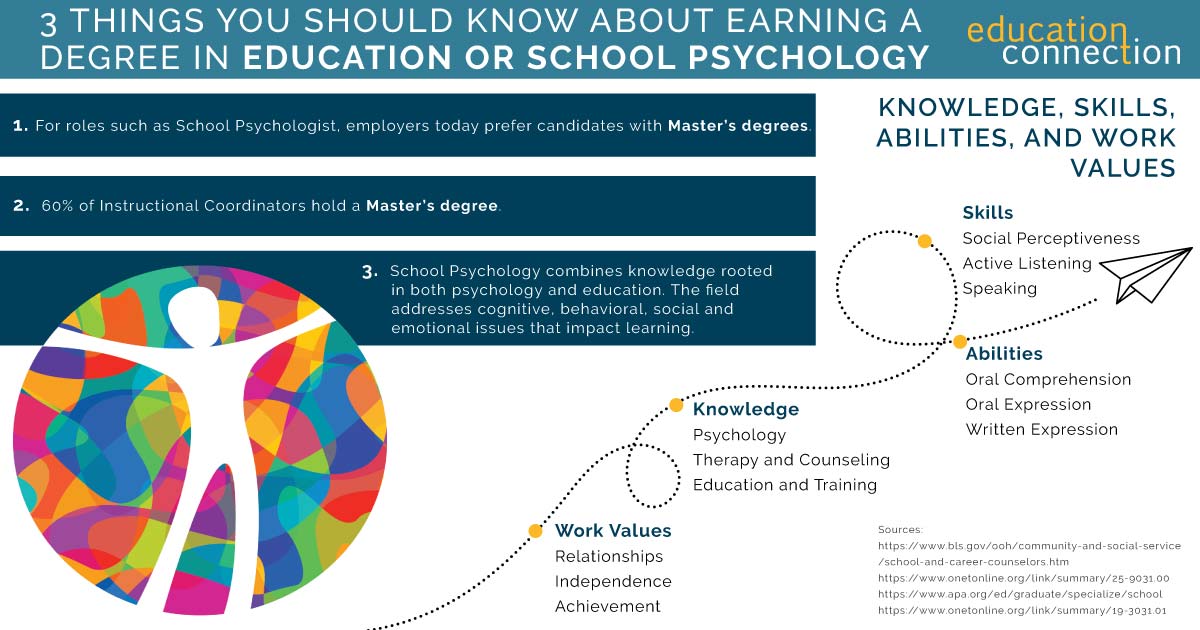What is a Online Educational and School Psychology Degree Program?
Online educational psych degree programs focus on the theories behind learning and human development. These programs are mostly at the grad level. So, they build on prior learning in education or a related area.
Programs may focus on the practice of how to create an effective curriculum. For instance, you could study how to design, implement, and evaluate education programs. That includes planning interventions to influence learners’ behavior. And, expect to study how adaptations can help make learning more accessible to those with certain needs.
Research methods may also play a key role. That’s because research that deals with the theory and practice of education is central to solving problems in the field. This is even more true at the PhD level. Students may design research studies, interpret their findings, and share what they’ve discovered.
Look for educational psych programs like:
- Master of Arts (M.A.) in Applied Educational Psychology
- Master of Science (M.S.) in Educational Psych
- Master of Education (MEd) in Educational Psychology
- PhD in Educational Psych
- Doctor of Education (Ed.D.) in Educational Psychology
You may also be able to choose a track or area of focus. These focus on the area of educational psych you’re interested in. Examples include: Development & Learning; Psychology and Education of Gifted Students; Evaluation, Measurement & Statistics; and more.

SCHOOL PSYCHOLOGY ONLINE DEGREE PROGRAMS
B.S. in Early Childhood Education
A B.S. in Early Child Education program aims to prepare you to create a caring and enriching educational experience for children. Through field work and student teaching, you may work with staff, peers and families, to plan and evaluate interventions.
Course Examples:
- Mathematics in Early Childhood
- Assessment in Early Childhood
- Creative Arts and Play Based Learning
Master of Science in School Psychology
This program aims to prepare students to work as school psychologists in elementary and secondary schools. School psychologists work with teachers, parents, and school personnel to create safe, healthy, and supportive learning environments for all students.
Course Examples:
- Psychological Foundation
- Assessment
- Intervention
School Psychology (Ph.D.)
This program aims to prepare students to work as school psychologists and may lead to eligibility for certification as a school psychologist and licensure as a psychologist.
Course Examples:
- General Psychology
- Child/Developmental Psychology
- Educational Psychology
School psych programs share some over lapping curriculum with education psych programs. But, these programs often zero in on the skill areas needed for a school psych career path.
School psychologists must typically earn at least a Master’s degree. Both at the Master’s and PhD levels, programs focus on the education and mental health factors that impact students’ development.
Course work may span a few key areas: education, psych, and research. For instance, you may take courses in instructional design and assessment. This is a chance to explore how the classroom can be more effective for diverse learners.
In psych courses, you’ll examine things from psychopathology to interventions. You could study counseling strategies to help you work with students. And, you’ll explore professional standards and ethics for serving in this field.
Finally, research may be important to your program. So, you may encounter courses from field research to statistics.
Look for school psych programs like:
- Master of Science (M.S.) in School Psych
- Doctor of Psychology (Psy.D.) in School Psychology
- PhD in School Psych
- Education Specialist (Ed.S.) in School Psychology
What Courses Could I Take in Education and School Psychology Programs?
Though educational psychology and school psychology degree programs have many focuses, they both take a deep dive into how people learn. Expect to study things from the theories behind learning and motivation to how the brain processes information.
Other common courses include:
Child and Adolescent Development: This course focuses on how children learn and grow. You’ll look at things from the social to the psychological aspects of a kid’s journey to adult hood. And, you’ll explore the implications for educators.
Testing, Measurement, and Assessment: Assessing students’ intelligence, personalities, and other characteristics is a big part of school and educational psych. This course covers the key theories, tools, and practices.
Working with Diverse Students: This course may go by many names, but it covers an essential topic. You’ll learn how students’ cultures and characteristics influence their educational experience. Expect to touch on areas like race, social class, gender, learning style, and beyond.
Research in the Social Sciences: This course covers how to understand research and conduct applied research. You’ll touch on the ethics of working with human subjects. And, you’ll learn practices and protocols specific to the social sciences.
How Long Does It Take to Earn a Degree in Educational Psychology and School Psychology?
Earning a Master’s in Psych can take about two years. A PhD can take between three and seven years to earn.

EDUCATION AND SCHOOL PSYCHOLOGY DEGREE PROGRAM EXAMPLES
| School | Degree Level | # of Credits Required | Start Dates | Minimum Months to Complete |
| Northcentral University | Master’s | 30 | 52 (weekly starts) | 20 |
| Walden University | PhD | Varies | Multiple | 66 |
The Cost of an Education and School Psychology Degree Program
The NCES puts the average cost of attending a public, four year school at $7,961 per year. For private and for profit schools, the average cost per year was $35,979. Compare tuition for these schools that offer education or school psychology programs:
| School | Degree Level | # of Credits Required | Cost Per Credit | Total Tuition Cost |
| Purdue University Global | Master’s | 52 | $420 | $21,840 |
| Northcentral University | Master’s | 30 | $2,577 (per 3 credit course) | $25,770 |
| Walden University | PhD | 85 (min., for related MS entry) | $585 | $49,725
|
Top Schools That Offer Education and School Psychology Online Degree Programs
DataUSA lists 209 schools with school psych programs. From those schools, 3,645 degrees were awarded to students in 2022 (the most recent data).
| School | 2022 Degrees awarded | 2023/24 Graduate Tuition (* unless out of state) |
| University of Cincinnati-Main Campus | 15 | $30,582 |
| National University | 105 | $13,320* |
| CUNY Brooklyn College | 52 | $15,402 |
| Rowan University | 37 | $25,564 |
| Fordham University | 41 | $61,992* |
| The University of Texas at Tyler | 19 | $25,198 |
| Teachers College at Columbia University | 54 | $34,971* |
| Chapman University | 40 | $62,784* |
| Yeshiva University | 17 | $49,900* |
What Does it Take to Become a School Psychologist?
To go for a school psych career path, you must earn an advanced degree along with certification or licensure. For instance, you could earn the Nationally Certified School Psychologist (NCSP) credential. This is based on standards for the education and skill areas school psychs need to have. These include knowledge of learning and how a child develops, instruction strategies, and ethics.
Credential requirements also depend on your state. For instance, to become a school psych in a state like Delaware, you’d need to earn both a certificate and a license. (The cert is in school psych, and the license allows you to practice in state.)
The certificate requires one of these:
- Graduation from a school psych program approved by NASP or APA
- The NCSP credential
- A valid and current school psych credential from another state
Always check with your state to make sure you are heading down the right path!


